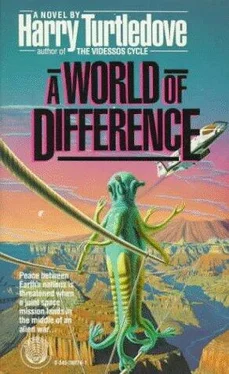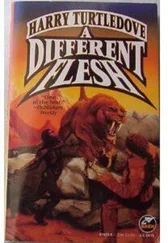“I remember,” Enoph said. “One looked just like the foot of a nosver turned to stone. How can a nosver turn to stone?”
That, Marquard thought, needed a longer and more complicated explanation than he could give. Fortunately, it also was not quite relevant. “Where that rock like nosver from?”
“Not far from the top of the gorge, as I recall,” Enoph answered. “What of it?”
“Now think on other fossil.”
“That weird creature?” Enoph made the shuddery gesture again. “It looked like an eloc, or rather a piece of an eloc, but hardly bigger than a runnerpest. Even newbudded eloca are three times that size.”
“No animal like that now, yes?” Marquard asked. Enoph repeated his hand closing gesture. The geologist went on. “Then that rock old, old, old, yes? No animal like that left now, yes? And that rock from where?”
Enoph pointed an eyestalk at a spot halfway down the side of the canyon. He suddenly turned four of his other eyes toward Marquard. The geologist smiled; no Minervan had ever shown him that much respect before. He also realized Enoph was no fool-he had not had to point out all the implications to the male. With data presented the right way, Enoph was plenty smart enough to work out implications for himself.
“You humans have the oddest notions,” he said. “I see this one is true, but who would have thought rocks could have ages? How does it help you to know this?”
The Minervan, Marquard thought unfairly, sounded like a congressman about to vote against a research appropriation. “The more you know, the more you can find out,” the geologist answered. “If you know nothing, how find out anything? Know one thing: this big rock”-he pointed to the boulder to which he had lashed himself-“come down from up there.” He pointed to a level not far from the one the older fossil had come from.
Minervans did not jump when they were surprised. If they had, Enoph would have. “How can you know that? I helped move it-and a nasty job it was-to secure the bridge to the Skarmer side of the gorge.”
Getting the idea of “bridge” across took a good deal of gesturing and guessing, not least because there was no bridge for Enoph to point at. When Frank Marquard finally thought he understood, he asked the Minervan, “Where bridge now? Not see.”
That got a response from several of the males who had come down, and not a polite one. They turned all their eyestalks away from the western side of the canyon and extended sharp fingerclaws as far as they would go. They also turned the bright yellow that Marquard had learned to be the color of anger.
“The stupid Skarmer wanted to cross to this side of Ervis Gorge and take our land and our mates from us,” Enoph said. “Seeing them try with the rope bridge up would have been plenty funny. How they propose to cross the gorge without it I cannot say.”
“Anyone with the wit even of a mate would see it can’t be done,” another male said. There was loud agreement from his companions.
Marquard looked toward the western horizon, which was, in essence, the distanceblurred western wall of Jotun Canyon. He had not thought his Minervan vocabulary would need to include terms like “invasion.” He looked again. Like Enoph, he had no idea how the Skarmer would get across the canyon if the people on this side did not feel like letting them. “They say they do this?” he asked at last.
“The Skarmer say all manner of foolish things,” Enoph said scornfully. “I think that comes down to them from the first Skarmer bud. What they can do is something else again.”
“I hope you right,” Marquard said. All the same, he remembered, and rather wished he hadn’t, something he had read or heard so long before that he had forgotten just where: “Son, if a man comes up to you in a bar and wants to bet he can make the jack of spades leap out of the deck and spit apple cider in your ear, never bet with that man because, son, if you do, sure as hell you’ll end up with an earful of cider.”
He snorted, imagining the fun he would have translating that into Minervan. His breath steamed out. What he did say was, “You watch, ah, Skarmer side of gorge to know Skarmer not come?”
“Aye, we watch,” Enoph said. “A waste of time, but we watch-the domain master would have it so. Like you when you check your rope so carefully, he takes few chances.”
“Thank you,” Marquard said; being compared to Reatur had to be a compliment. The geologist gave the line another yank, though now he was convinced it would hold-if that boulder had supported a rope long enough to stretch across Jotun Canyon, his relatively tiny weight would not send it tumbling into the abyss.
He made the check just the same. It was, after all, his neck.
Moving slowly and cautiously, he began to descend. The going was still a long way from extreme; he did not need to think to pick hand and footholds. He thought about the Skarmer in stead. Jotun Canyon struck him as a handy sort of thing to have between oneself and unfriendly neighbors…
“At least,” he muttered, “till they figure out how to shoot across it.” He reminded himself to tell Irv about what Enoph had said-and Emmett Bragg, too, come to think of it. Assessing threats was part of Bragg’s job.
As he lowered himself, he began concentrating more and more on his own job. The wall of Jotun Canyon was like an enormous geological layer cake, with him the tiniest of ants nibbling data from it.
In more literal terms, the canyon wall was sandstone alternating with conglomerate, with an occasional thin layer of igneous rock telling of a time of vulcanism. Frank felt like cheering every time he came across one of those. He collected igneous specimens with special care. Potassium-argon dating from them would give him absolute dates on which to hang the relative dates of the stratigraphy he was developing.
Thought about another way, the conglomerates might have been even more impressive than granite or basalt. The rocks accreted in the sandy matrix ranged up from pea sized to bigger than a VW bus. When the glacier melt off got rolling, it did not care what it moved. Anything in the way went.
For the moment, though, Marquard was scrambling over neither pragmatically valuable igneous rock nor awe-inspiring conglomerates. This layer was just rather weathered yellow-brown sandstone. He got out his geologist’s hammer and took several small specimens.
He grinned wryly as he wrote up a data tag for each one. If he had taken all the specimens he wanted, Athena would have ended up too heavy to get them back to Earth.
His eyes flicked over an oddly shaped shadow, and he bent down for a closer look. Only remembering that he would alarm the Minervans above kept him from shouting out loud. Finding a fossil was always good for a rush.
The thing was not very big and was built on the same radial pattern dominant all over Minerva. Aside from that, it didn’t look like anything with which Frank was familiar. No reason it should, he thought; it was a couple of hundred million years old if it was a day. Maybe Pat would have some idea of what it was related to.
He photographed the fossil in situ. Then, using hammer and chisel, he freed the stone in which it was embedded from the canyon wall. He was glad it was small. That way he could get it all out, which would make his wife happy.
He wondered what Pat would have done had he stumbled over the Minervan equivalent of, say, Brachiosaurus. He had a picture of her holding a gun on the rest of Athena’s crew and as many locals as possible until they dug out the whole specimen. When Pat set her mind on something, she generally got it.
She would have nothing to complain about this time, he thought as he wrapped the fossil in bubbled plastic and stuck it in the bag he carried on his belt just for such lucky finds. Minervan fossils, Frank thought fondly, were the most fun Pat had out of bed.
Читать дальше












